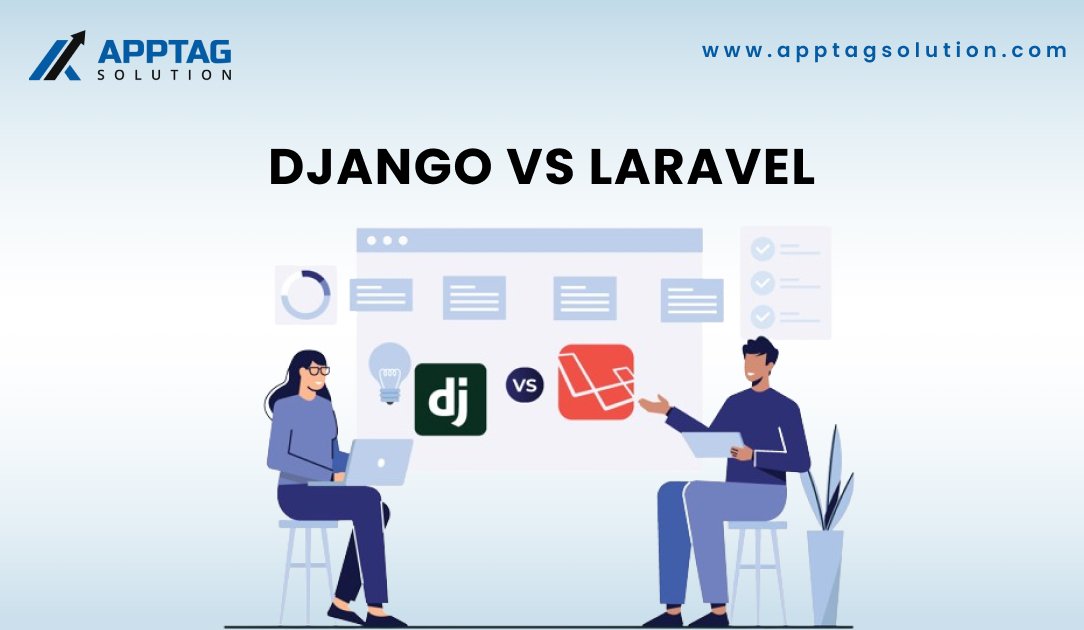When it comes to web development, choosing the right framework is crucial for the success of your project. Two of the most popular options in the industry are Django and Laravel. While both are powerful tools for building web applications, they have distinct features, strengths, and weaknesses. In this article, we’ll compare Django and Laravel, exploring their features, performance, learning curve, community support, security, and more, to help you make an informed decision for your next project.if you want know another framework then,Laravel vs Symfony: Which framework to choose in year 2024
Introduction to Django vs Laravel
Django and Laravel are open-source web development frameworks that provide developers with the tools and libraries needed to build robust and scalable web applications. Django, written in Python, is known for its simplicity, flexibility, and emphasis on rapid development. On the other hand, Laravel, built with PHP, offers elegant syntax, expressive code, and a rich ecosystem of packages and extensions.
Django: Features and Benefits
Django is a high-level web framework that encourages rapid development and clean, pragmatic design. It comes with built-in features such as an ORM (Object-Relational Mapping) system, authentication, URL routing, and template engine, which simplify common tasks and streamline the development process. Django’s batteries-included approach and adherence to the “Don’t Repeat Yourself” (DRY) principle make it an ideal choice for projects of all sizes.
Laravel: Features and Benefits
Laravel is a PHP web framework known for its elegant syntax, expressive code, and developer-friendly features. It offers a wide range of built-in tools and libraries, including a powerful ORM (Object-Relational Mapping) system, expressive query builder, and intuitive routing system. Laravel’s modular structure, elegant syntax, and robust ecosystem of packages make it a popular choice for building modern web applications.
Performance Comparison
When it comes to performance, both Django and Laravel are capable of handling high-traffic websites and applications. However, there are differences in their performance characteristics, depending on various factors such as server configuration, database optimization, and caching mechanisms. In general, Django tends to have better performance out-of-the-box due to its lightweight architecture and efficient request handling.
Learning Curve
The learning curve for Django and Laravel varies depending on the developer’s familiarity with the underlying programming languages (Python for Django and PHP for Laravel) and their previous experience with web development frameworks. Generally, Django is considered easier to learn for beginners due to its clear and concise documentation, while Laravel’s expressive syntax and rich feature set may require more time to master.
Community Support and Ecosystem
Both Django and Laravel have vibrant communities of developers, contributors, and enthusiasts who actively contribute to their development and provide support through forums, documentation, and online resources. Django boasts a large and active community, with a wealth of plugins, libraries, and third-party packages available for extending its functionality. Similarly, Laravel has a strong community presence, with a thriving ecosystem of extensions, packages, and tutorials.
Scalability and Flexibility
Scalability is an essential consideration for web applications, especially those expected to handle a large volume of traffic or user interactions. Django and Laravel offer scalability options such as horizontal scaling, caching, and asynchronous task processing, allowing developers to scale their applications to meet growing demand. Both frameworks are flexible and adaptable, making them suitable for a wide range of projects and industries.
Security
Security is paramount in web development, and both Django and Laravel provide built-in features and best practices to help developers create secure applications. Django offers robust security features such as protection against common vulnerabilities like SQL injection, cross-site scripting (XSS), and cross-site request forgery (CSRF). Similarly, Laravel includes security measures such as CSRF protection, input validation, and encryption out-of-the-box.
Use Cases and Industries
Django and Laravel are versatile frameworks that can be used to build a wide range of web applications, from simple blogs and content management systems to complex e-commerce platforms and enterprise solutions. Django is commonly used in industries such as publishing, social networking, and scientific computing, while Laravel is popular in e-commerce, SaaS (Software as a Service), and fintech (financial technology) sectors.
Integration and Compatibility
Both Django and Laravel are highly compatible with other technologies and platforms, making it easy to integrate them with databases, APIs, and third-party services. Django supports various databases such as PostgreSQL, MySQL, and SQLite, while Laravel offers seamless integration with popular databases like MySQL and PostgreSQL. Additionally, both frameworks provide RESTful API support, enabling interoperability with frontend frameworks and mobile applications.
Future Outlook
Looking ahead, both Django and Laravel are expected to continue evolving and improving, with new features, enhancements, and optimizations being introduced regularly. Django’s strong focus on simplicity, reliability, and backward compatibility ensures a stable and sustainable platform for web development. Similarly, Laravel’s commitment to innovation, developer experience, and community engagement bodes well for its future growth and adoption.
Decision Factors for Choosing Between Django and Laravel
When deciding between Django and Laravel for your next project, several factors should be taken into account, including your familiarity with the programming languages, project requirements, scalability needs, and available resources. Considerations such as ease of learning, community support, performance, security, and compatibility can help inform your decision and ensure the success of your web development endeavor.
